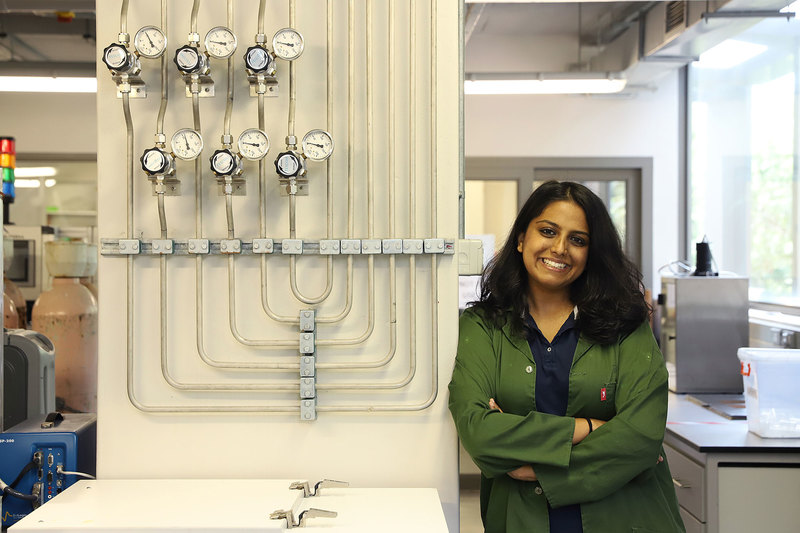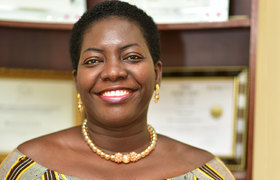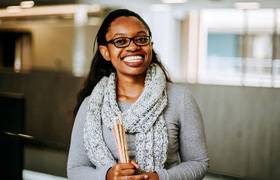Distinction for first Electrolyser Research Group master’s graduate
11 December 2020 | Story Helen Swingler. Photo Michael Hammond. Read time 7 min.
“It makes me feel incredible,” Ziba Rajan said, describing her emotions on the eve of something special. The University of Cape Town (UCT) postgraduate is not only thrilled to be the first master’s graduate from the Electrolyser Research Group but delighted that she will receive her degree cum laude.
Ziba, who is from Kenya, is one of hundreds of students who will graduate virtually on 15 December, after live ceremonies were halted to prevent COVID-19 transmission. This is one of two virtual graduation celebratory events, a first for the university. The other will be held on 14 December.
The Electrolyser Research Group is part of the HySA Catalysis Competence Centre, hosted by UCT’s Institute for Catalysis Research, in the Department of Chemical Engineering; and Mintek, South Africa’s national mineral research organisation. HySA Catalysis is one of three national Centres of Competence with the mandate to develop materials, components and units in the early part of the fuel cell and hydrogen-generation value chain.
Sustainable world
Spurred by her master’s work, Ziba has registered for a PhD in the group, which is focused on developing advanced electrolyser catalyst materials for hydrogen production. Electrolysers are devices that convert electrical energy into chemical energy in the form of oxygen and hydrogen. When the electrical energy is derived from renewable sources, such as wind and solar, the hydrogen produced can be used as a potential clean energy carrier to replace fossil fuels and help to decarbonise the global economy.
She said that she’d been engrossed by her master’s project, titled “Iridium oxide supported on antimony-doped tin oxide as an electrocatalyst for the oxygen evolution reaction”. Iridium is described as a hard, brittle, transition metal of the platinum group and considered to be the second-densest metal. Oxygen evolution is the process of generating molecular oxygen by a chemical reaction, usually from water.
While electrolysis technology holds hope for a more sustainable world, commercialising the technology is restricted by the large capital costs associated with its components, Ziba said.
Novel contributions
Her work made some interesting and novel contributions to the field. As a result, she was able to publish these in a prestigious journal earlier this year.
“I set out to develop a method to synthesise highly active and durable oxide-supported iridium oxide catalysts for oxygen evolution in proton exchange water electrolysis using an organometallic chemical deposition technique,” she explained.
“The work demonstrated that it is possible to make supported catalysts with interfaces that are engineered towards making the best of the rare and expensive noble metals used to make these materials.”
“The very first career I seriously considered was as an astronaut.”
Noble metals are metallic elements that are highly resistant to chemical attack – even at high temperatures. They are also well known for their catalytic properties.
“The material I made in my master’s was able to catalyse the oxygen evolution reaction using 80% less iridium than the state-of-the-art commercial benchmark, with five times higher activity and comparable durability.”
“Our group focuses on the development of high-performance catalysts and electrodes using as little noble metal as possible. Development in this work can make huge strides towards affordable electrolyser components – and commercialisation.”
Ziba is also the president of the Electrochemical Society Student Chapter at UCT. She’s always been drawn to science, she said.
“The very first career I seriously considered was as an astronaut; soon after, a geologist and then, like many people, a brief period wanting to be a medical doctor.”
A cousin studying electrical engineering introduced her to chemical engineering. He’d guessed she might be interested.
“I looked up what chemical engineering was, and the rest is history.”
Designing catalytic chemicals
She did her undergrad at UCT (2014 to 2017), attracted by its “stellar reputation” and affordable fees in comparison to other world-class international universities. But during her undergrad years Ziba began developing her own interests: reaction engineering and designing catalytic materials to make chemical processes more efficient.
“My final-year thesis was in the catalysis research niche, and this propelled me to an MSc in the design of catalysts for water electrolysis,” she said.
She was supervised by the Electrolyser Research Group’s Dr Rhiyaad Mohamed and Dr Tobias Binninger of the Centre National de la Recherche Scientifique in France.
Ziba’s PhD will expand on her master’s findings and explore new facets of the field. She hopes to create new knowledge that will foster the systematic development and design of outstanding oxygen evolution catalysts.
“I can have all my friends and family watching the ceremony online, at the same time.”
“We have some exciting work planned; this involves the use of advanced methods that are used predominantly in solid-state physics.”
Like many, she will be graduating in unusual circumstances thanks to COVID-19. But there is a bright side – and she has a plan to celebrate.
“The one positive thing to come from all of this is that I don’t have to figure out who to give the usual two tickets to! I can have all my friends and family watching the ceremony online, at the same time. I have a small dinner planned afterwards, just to celebrate this amazing moment.”
The last word comes from her supervisor, Dr Mohamed: “Ziba never ceases to amaze me. Her energy and enthusiasm for her work is unrivalled. It has been a pleasure to work with her, and I look forward to continuing the journey. Congratulations on this incredible achievement!”
 This work is licensed under a Creative Commons Attribution-NoDerivatives 4.0 International License.
This work is licensed under a Creative Commons Attribution-NoDerivatives 4.0 International License.
Please view the republishing articles page for more information.










